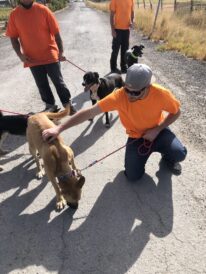Dogs and inmates getting a new leash on life
- Inmates at the Utah County Jail participate in the New Leash on Life program, learning to train and take care of dogs. The program has benefited 28 dogs and many inmates in the past year.
- Inmates at the Utah County Jail participate in the New Leash on Life program, learning to train and take care of dogs. The program has benefited 28 dogs and many inmates in the past year.

Courtesy photo
Inmates at the Utah County Jail participate in the New Leash on Life program, learning to train and take care of dogs. The program has benefited 28 dogs and many inmates in the past year.
It has been a little over a year since the New Leash on Life program began at the Utah County Jail, and both inmates and dogs are experiencing the benefits. The dog rescue program pairs unadoptable dogs from the South Valley Animal Shelter with inmates at the jail for training and companionship.
“It’s actually been fantastic,” said Sgt. Chris Sainsbury, who oversees the program. “It’s a therapeutic opportunity for the inmates and helps the dogs.”
During this past year, 28 dogs have come through the program. Most have previously experienced some sort of abuse and are hesitant to have any interaction. “We walk near them and they lower their heads to the ground, as if expecting some sort of punishment,” Sainsbury said. “We have dogs that come in that will not even leave their kennels. They are so afraid.”
But, within a week of training and bonding with the inmate handlers, the dogs are friendly and confident, according to Sainsbury. Usually, there are five dogs at a time participating in the program. “Every one of them has gone straight from dogs that don’t seem adoptable yet to going straight into the adoption pool,” Sainsbury said.
In the program, each dog is paired up with an inmate. The inmate handlers learn about dog training and then begin their work, about three to five hours each day. “They know this program is unique. Very few inmates across the country are able to be incarcerated and have an animal who doesn’t judge them, is grateful to be with them,” Sainsbury said.

Courtesy photo
Inmates at the Utah County Jail participate in the New Leash on Life program, learning to train and take care of dogs. The program has benefited 28 dogs and many inmates in the past year.
“This allows them to be outside in the sun. While they work in the jail garden, the dogs are with him, watching them. They play with the dogs during breaks. They learn responsibility, make sure they’re fed, bathed, clean the kennels, watch for medical issues,” Sainsbury said. “The animal comes from a place that needs healing. The inmates need the same thing.”
In fact, seven of the dogs who have been in the program have been adopted by their inmate handlers upon release from jail. In a few instances, deputies have put their own funds together to help the inmates with the adoption fees.
Utah County resident Jacob Denver spent about six months at the jail during this past year, and was happy to get involved with the program. The dog that he was paired up with, Muzzy, has become a companion in his post-jail life.
Usually, after the dogs have been trained to the point that they are comfortable with people and obey simple commands, they become available for adoption through the animal shelter. In Muzzy’s case, Denver took her in when he left jail.
He said he believes that dogs are healers, they are intuitive and can help with depression and anxiety. “Any way we can help people transition back into society and have a better chance for succeeding, I’m an advocate for that,” he said.
“Once we got home, she just lit up. I absolutely adore her. She has been the best thing that’s happened to me in a really long time. She is smart and loving,” Denver said. “Maybe I had to go to jail just to get this dog.”
Sheriff Mike Smith said that the inmates are excited about what they’re doing in jail thanks to the program. “I’ve been there when the inmates are out with their dogs. They are so proud of those dogs. They say, ‘Sheriff, let me show you my dog,’ and they show some of the things they are working on with them,” he said.
“They’re doing something positive and they’re making a difference for the dogs and, probably more importantly, for themselves,” Smith added. “For some of them, it may be the first time they’ve had the opportunity to serve in this way. I am really proud of the program.”
Smith said that for some inmates, incarceration is a time in their lives that they’re going to be clean safe, fed properly and get some clarity to think, “Who am I? Is this what I really want in life?”
“Any program like this that we can offer them, to help them change their lives, can make a difference,” he said.





